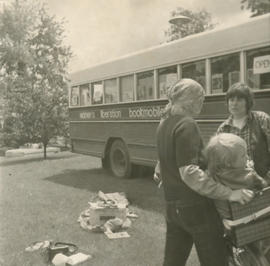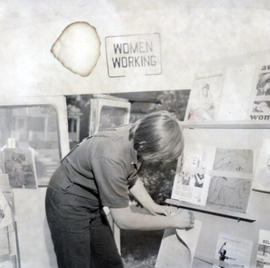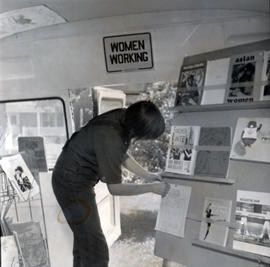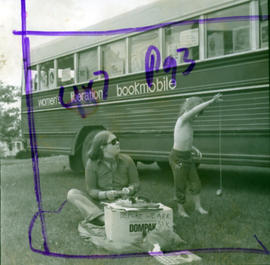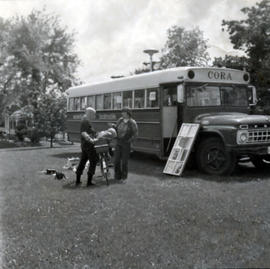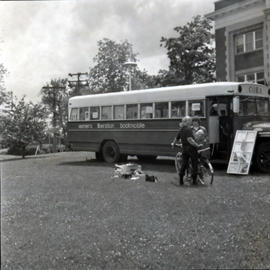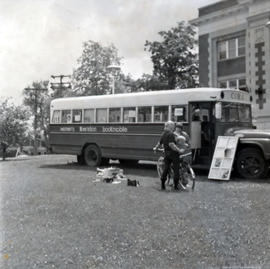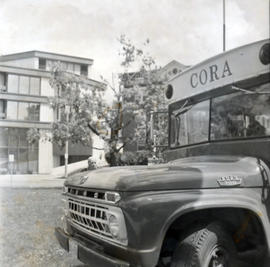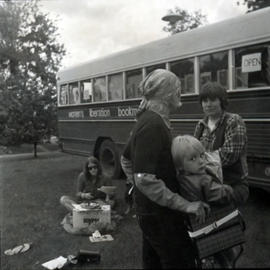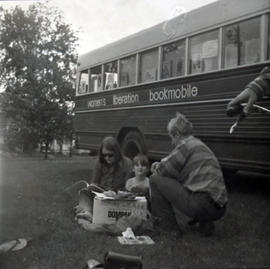タイトルおよび責任表示のエリア
タイトル
The Women's Liberation Bookmobile fonds
一般資料の指定
- Graphic materials
併記されるタイトル
他のタイトル情報
Feminist Bookmobile
責任のタイトル表示
タイトル記述
記述レベル
Fonds
レファレンスコード
CA ON0034 10-015
版次エリア
版次の表示
責任表示の編集
資料詳細の分類のエリア
縮尺の表示(地図)
図法の表示(地図)
座標の表示(地図)
責任表示(建築)
発行政府と額面の表示(切手コレクション)- 必須項目
作成日のエリア
日付
-
1974-1975 (作成)
物理的記述エリア
物理的記述
1.7 cm of textual records
9 photographs ; 2 contact sheets
9 photographs ; 2 contact sheets
出版社のシリーズエリア
出版社のシリーズのタイトル
出版社のシリーズの併記されるタイトル
出版社のシリーズの他のタイトル情報
出版社のシリーズの責任表示
出版社のシリーズの番号
出版社のシリーズの注記
アーカイブズ記述エリア
作成者名
(1974-1975)
管理の履歴
"CORA was the creation of Judith Quinlan, Boo Watson and Ellen Woodsworth, three young women from Toronto who began planning the feminist bookmobile in 1973. They raised funds, promoted their plan, and bought and outfitted an old school bus, transforming it into a mobile library to promote information about women. A government grant provided the funding which got the wheels turning for the bus to begin its travels through rural Ontario in 1974.
Four other women joined them for the summer. “Women’s Liberation Bookmobile” was painted in large letters on CORA’s side. Inside the bus, racks held books (for sale, loan and to give away) by, for and about women, their history and the growing women’s liberation movement.
CORA was named for E. Cora Hind, a pioneer suffragist, grain grower and writer. The motivation for the travelling bookmobile was to make women’s books, periodicals and newspapers more readily available to women in small towns. Judith and Ellen wanted to help women in isolated situations find each other, facilitate communication and demystify women’s liberation, encourage schools, libraries and community centres to be aware of women’s resources and materials, and encourage women to write about their own experiences.
The women who operated CORA worked collectively, with a flexible attitude always open to new ideas. They would arrive in town, displaying their, “Women Working” sign, choose a conspicuous parking spot and then haggle with town officials for permission to park. Then they would set up, using an outdoor display rack (until it was run over in Huntsville!), distributing flyers about CORA, contacting local media, directly leafleting on the town streets.
Many women, young and old, from all backgrounds, visited CORA. Women’s groups were beginning to form in some locations, and CORA’s staff participated in meetings. The bookmobile carried information from women’s centres across Ontario and gave away literature. Women were delighted to see CORA the feminist bookmobile in their town.
The adventures of CORA were recounted in a Toronto feminist newspaper, The Other Woman, in 1975. In one town, Boo and Ellen got thrown out of the pool hall because, “there was no women’s washroom.” Camp counselors came and talked. One said, “This night might change my whole life.” The presence of CORA, the Feminist Bookmobile, in that summer of 1974, turned heads and raised consciousness.
-
CORA est la création de Judith Quinlan, Boo Watson et Ellen Woodsworth, trois jeunes femmes de Toronto qui ont commencé à planifier le bibliobus féministe en 1973. Elles ont collecté des fonds, fait la promotion de leur projet, acheté et aménagé un vieux bus scolaire qu'elles ont transformé en bibliothèque mobile pour promouvoir l'information sur les femmes. Une subvention gouvernementale leur fournit le financement nécessaire pour que le bus commence à parcourir les régions rurales de l'Ontario en 1974.
Quatre autres femmes les rejoignent pour l'été. Le nom ""Women's Liberation Bookmobile"" (bibliobus de la libération des femmes) est peint en grosses lettres sur le flanc du CORA. À l'intérieur du bus, des étagères contenaient des livres (à vendre, à prêter et à donner) écrits par, pour et sur les femmes, leur histoire et le mouvement de libération des femmes en plein essor.
CORA a été baptisé en l'honneur d'E. Cora Hind, une pionnière suffragiste, céréalière et écrivaine. La motivation de ce bibliobus itinérant était de rendre les livres, périodiques et journaux féminins plus facilement accessibles aux femmes des petites villes. Judith et Ellen voulaient aider les femmes isolées à se retrouver, faciliter la communication et démystifier la libération des femmes, encourager les écoles, les bibliothèques et les centres communautaires à connaître les ressources et le matériel destinés aux femmes, et encourager les femmes à écrire sur leurs propres expériences.
Les femmes qui géraient CORA travaillaient collectivement, avec une attitude flexible et toujours ouverte aux nouvelles idées. Elles arrivaient en ville en arborant leur panneau ""Women Working"", choisissaient une place de parking bien visible et marchandaient avec les fonctionnaires de la ville pour obtenir l'autorisation de se garer. Puis elles s'installaient, utilisant un présentoir extérieur (jusqu'à ce qu'il soit écrasé à Huntsville !), distribuant des dépliants sur l'ACRO, contactant les médias locaux, distribuant directement des tracts dans les rues de la ville.
De nombreuses femmes, jeunes et moins jeunes, de tous horizons, ont visité l'ACRO. Des groupes de femmes commençaient à se former dans certains endroits et le personnel de l'association participait aux réunions. Le bibliobus transporte des informations provenant des centres de femmes de tout l'Ontario et distribue de la documentation. Les femmes sont ravies de voir CORA, le bibliobus féministe, dans leur ville.
Les aventures de CORA ont été relatées dans un journal féministe de Toronto, The Other Woman, en 1975. Dans une ville, Boo et Ellen ont été expulsées de la salle de billard parce qu'il n'y avait pas de toilettes pour femmes. Les conseillers du camp sont venus parler. L'une d'entre elles a déclaré : ""Cette nuit pourrait changer toute ma vie"". La présence de CORA, le bibliobus féministe, au cours de cet été 1974, a fait tourner les têtes et a éveillé les consciences."
Four other women joined them for the summer. “Women’s Liberation Bookmobile” was painted in large letters on CORA’s side. Inside the bus, racks held books (for sale, loan and to give away) by, for and about women, their history and the growing women’s liberation movement.
CORA was named for E. Cora Hind, a pioneer suffragist, grain grower and writer. The motivation for the travelling bookmobile was to make women’s books, periodicals and newspapers more readily available to women in small towns. Judith and Ellen wanted to help women in isolated situations find each other, facilitate communication and demystify women’s liberation, encourage schools, libraries and community centres to be aware of women’s resources and materials, and encourage women to write about their own experiences.
The women who operated CORA worked collectively, with a flexible attitude always open to new ideas. They would arrive in town, displaying their, “Women Working” sign, choose a conspicuous parking spot and then haggle with town officials for permission to park. Then they would set up, using an outdoor display rack (until it was run over in Huntsville!), distributing flyers about CORA, contacting local media, directly leafleting on the town streets.
Many women, young and old, from all backgrounds, visited CORA. Women’s groups were beginning to form in some locations, and CORA’s staff participated in meetings. The bookmobile carried information from women’s centres across Ontario and gave away literature. Women were delighted to see CORA the feminist bookmobile in their town.
The adventures of CORA were recounted in a Toronto feminist newspaper, The Other Woman, in 1975. In one town, Boo and Ellen got thrown out of the pool hall because, “there was no women’s washroom.” Camp counselors came and talked. One said, “This night might change my whole life.” The presence of CORA, the Feminist Bookmobile, in that summer of 1974, turned heads and raised consciousness.
-
CORA est la création de Judith Quinlan, Boo Watson et Ellen Woodsworth, trois jeunes femmes de Toronto qui ont commencé à planifier le bibliobus féministe en 1973. Elles ont collecté des fonds, fait la promotion de leur projet, acheté et aménagé un vieux bus scolaire qu'elles ont transformé en bibliothèque mobile pour promouvoir l'information sur les femmes. Une subvention gouvernementale leur fournit le financement nécessaire pour que le bus commence à parcourir les régions rurales de l'Ontario en 1974.
Quatre autres femmes les rejoignent pour l'été. Le nom ""Women's Liberation Bookmobile"" (bibliobus de la libération des femmes) est peint en grosses lettres sur le flanc du CORA. À l'intérieur du bus, des étagères contenaient des livres (à vendre, à prêter et à donner) écrits par, pour et sur les femmes, leur histoire et le mouvement de libération des femmes en plein essor.
CORA a été baptisé en l'honneur d'E. Cora Hind, une pionnière suffragiste, céréalière et écrivaine. La motivation de ce bibliobus itinérant était de rendre les livres, périodiques et journaux féminins plus facilement accessibles aux femmes des petites villes. Judith et Ellen voulaient aider les femmes isolées à se retrouver, faciliter la communication et démystifier la libération des femmes, encourager les écoles, les bibliothèques et les centres communautaires à connaître les ressources et le matériel destinés aux femmes, et encourager les femmes à écrire sur leurs propres expériences.
Les femmes qui géraient CORA travaillaient collectivement, avec une attitude flexible et toujours ouverte aux nouvelles idées. Elles arrivaient en ville en arborant leur panneau ""Women Working"", choisissaient une place de parking bien visible et marchandaient avec les fonctionnaires de la ville pour obtenir l'autorisation de se garer. Puis elles s'installaient, utilisant un présentoir extérieur (jusqu'à ce qu'il soit écrasé à Huntsville !), distribuant des dépliants sur l'ACRO, contactant les médias locaux, distribuant directement des tracts dans les rues de la ville.
De nombreuses femmes, jeunes et moins jeunes, de tous horizons, ont visité l'ACRO. Des groupes de femmes commençaient à se former dans certains endroits et le personnel de l'association participait aux réunions. Le bibliobus transporte des informations provenant des centres de femmes de tout l'Ontario et distribue de la documentation. Les femmes sont ravies de voir CORA, le bibliobus féministe, dans leur ville.
Les aventures de CORA ont été relatées dans un journal féministe de Toronto, The Other Woman, en 1975. Dans une ville, Boo et Ellen ont été expulsées de la salle de billard parce qu'il n'y avait pas de toilettes pour femmes. Les conseillers du camp sont venus parler. L'une d'entre elles a déclaré : ""Cette nuit pourrait changer toute ma vie"". La présence de CORA, le bibliobus féministe, au cours de cet été 1974, a fait tourner les têtes et a éveillé les consciences."
収蔵状況の経緯
Material donated by Betty Gibb, Toronto Public Library, April 14, 1994.
範囲と内容
The fonds consists of documents relating to the creation and the tour of the Women's Liberation Bookmobile also know as the Cora Bookmobile.
-
Le fonds est constitué de documents relatifs à la création et à la tournée du Bibliobus de la libération des femmes, également connu sous le nom de Bibliobus Cora.
-
Le fonds est constitué de documents relatifs à la création et à la tournée du Bibliobus de la libération des femmes, également connu sous le nom de Bibliobus Cora.
注記のエリア
物理的条件
直接の取得先
Betty Gibb
編成
言語資料
- 英語
資料のスクリプト
原資料の所在
他のフォーマットの利用可能性
アクセス制限
Documents are open.
使用、複製、出版関係用語
Some restrictions could apply considering the fragility of the documents.
検索手段
関連する素材
See the CWMA collection (10-001), Photographs Series.
追加資料
別の識別子
標準番号
標準番号
アクセスポイント
名称アクセスポイント
ジャンルのアクセスポイント
管理のエリア
記述レコードの識別子
機関識別子
ON0034
ルールまたは規則
RAD
状態
最終
詳細さの水準
作成 訂正 削除の日付
記述言語
- 英語

